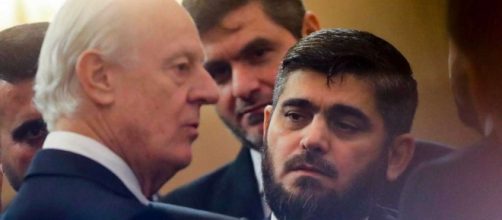The meeting was attended by the government members of Bashar al-Assad for the first time and representatives of the armed opposition. Russia, Iran, and Turkey at the negotiating table were able to work out a mechanism of the ceasefire. As was surveyed earlier, the representative of the UN Secretary-General, Staffan de Mistura said that the conversation was useful and productive - which is especially important on the eve of the Geneva meeting.
According to the diplomat, the negotiations resulted in concrete conclusion
"After long discussions, they offered a mechanism which will ensure that a new truce, unlike the previous ones, will not be ripped off" - he added.
De Mistura also noted that the meeting in Astana was useful in terms of preparing for the negotiations on the Syrian settlement, to be held in Geneva in February.
"The conclusion of such a vital armistice ensures the necessary political climate for such discussions," - summed up the special representative of the UN Secretary-General.
The opposition - separately, the terrorists - separately
On the eve of the Minister of Foreign Affairs of Kazakhstan - Kairat Abdrakhmanov noted that the main outcome of the talks in Astana was the decision of Turkey, Iran, and Russia to establish a tripartite mechanism, which would allow monitoring the cease-fire regime in the Syrian Arab Republic.
However, the opposition, whose representatives were invited to Astana, refused to sign the document.
Opposition members do not hide their dissatisfaction with the negotiations due to the Iranian position, which is not going to withdraw its armed forces from Syria. As noted in a statement, Moscow is not yet able to put pressure on Iran to persuade it to stop "violation of a truce in Syria," from December 30.
On another side, Tehran does not want to weaken their position in the country, where there are military advisers of the country, as well as Shiite militia groups for a long time. They provided substantial support to the regime of Syrian President - Bashar al-Assad, who has historic ties with Iran. Syrian opposition members also believe that exactly Iranian forces violate a truce in Syria.
Their dissatisfaction with the failure of the opposition to sign the final document has already expressed Damascus. Permanent Representative of that country to the UN - Bashar Jaafari reminded the opposition that Iran - one of the three guarantors of the agreement.
In addition, all the parties of the discussion expressed their intention to separate the armed opposition from the terrorist groups.
"The fact of the voluntary participation in the debate can be regarded as a serious argument for any political groups' engagement in opposition, not in terrorism" - Abdrakhmanov said.
All in all the negotiations that took place in the capital of Kazakhstan, 23 and 24 January, was attended by representatives of 12 Syrian opposition groups.
Five of them have expressed willingness to join the truce.
As previously emphasised by Russian Foreign Minister - Sergei Lavrov, "meeting in Astana is designed to formalise an agreement for full participation in the process (to resolve the situation in Syria) of the armed groups."
The conversation will continue in Geneva on February 8, where parallel negotiations under UN auspices should be held. One of the main intrigues of the talks will be attended by representatives of the alleged Kurdish rebels, who refused to participate in the negotiations in Kazakhstan because of Ankara's position on their autonomy. As stated on Tuesday, the UN Special Representative for Syria - Staffan de Mistura, the question of the presence of the Kurdish delegation in Geneva will be resolved in early February.

